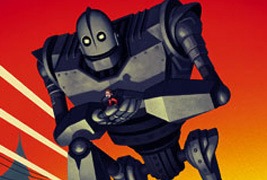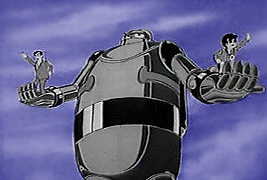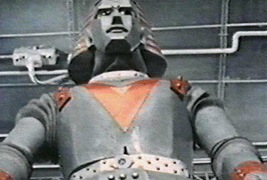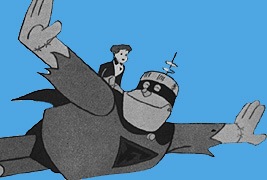

There's been a lot of hyper-zealously positive buzz about this movie going round the Internet. It's been called the best movie of the year, even the best movie of the decade, cartoon or otherwise. Perhaps the critics doth promote too much. In my book, though, it probably ranks, along with eXistenZ, as the best science fiction movie of the year. Certainly it's also the best boy-and-his-giant-flying-robot movie ever. Ever.
That might sound like more of a pimp slap than a compliment, but it's not. You need to remember that mine was the generation that grew up with boy-and-his-giant-flying-robot shows. We watched the TV adventures of Gigantor (the American version of Tetsujin 28), the space-age robot, whose power was at the command of little Jimmy Sparks. And of course there was Johnny Sokko and his Flying Robot, which featured weekly grudge matches against the likes of the Starfish Monster Scanlon, the Electric Monster Tentaclonn, the Terrifying Space Mummy, and the Monstrous Flying Jawbone (I'm not making this up). Combine that all with Frankenstein, Jr., and it's quite a crowd of giant flying robots. It's important to remember that The Iron Giant isn't competing directly against those old shows, now virtually unwatchable with their crude animation and amateurish plotlines. No, Iron Giant is competing against my rose-tinted memory of those shows - shows seen back when I was so young and impressionable, when I didn't recognize the crude or amateurish, but when I was ready to soar through the sky, cradled in the hands of a giant flying robot.




Iron Giant; Gigantor;
Johnny Sokko's Flying Robot; Frankenstein, Jr.
And, you know what? Iron Giant knocks its competition flat. It's not just a great giant flying robot movie, but a great movie. Period. Animated or otherwise, science fiction or otherwise.
The key to the success of the movie (and what has been shockingly absent in recent science fiction movies) is the strength of its script, by director Brad Bird and Tim McCanlies. It's not hokey or overly sentimental; there are no silly "crowd-pleasing" puns, and nobody breaks out spontaneously in song and dance. Also, there are no comic-relief side-kicks. The characters are all interesting and well-defined, especially the boy, Hogarth Hughes (voiced by Eli Marienthal) and the giant robot, voiced in basso profundo by Vin Diesel.
Hogarth gains our sympathies early in the film, as a kid whose mother is wary of him bringing home stray animals as pets, as a scrawny kid who gets beaten up by bigger kids, as a kid whose mom (dad's nowhere to be seen) often has to leave him alone as she works late at the diner. He's just another kid, but in the course of the movie he grows up, finds a friend, teaches lessons about life, and even risks his own neck to save others. He's a believable little hero.
The Iron Giant himself is a marvel. His face is simple - just a dome for head, big clunky jaw and two round lenses for eyes. But a lot of emotion is expressed in those eyes. At first they are white circles, like the blank slate of the robot's innocent soul; later shutters appear to change their shape, conveying dejection or excitement; finally the eyes turn angry, shuttering down to burning balls of red fire.
He's a great character, this Iron Giant. He's not just a toy to Hogarth, with no more personality than a wind-up automaton. He is at times sleepy, sad, restless, hungry, caring, startled, silly, confused - a greater range of emotions than most human actors convey in a movie. Early in the film, his round head is dented a bit, and he has lost some of his memory. He's not quite sure where he came from or what his purpose is (some, but not all of this is spelled out in the film, leaving space for a sequel). Hogarth takes him in, like a wounded animal, finding him food and teaching him. This relationship is the core of the film's power and poignancy. From the boy, the robot learns what it means to die, what it means to kill. He learns he can't selfishly eat up everything (he eats metal things like cars and railroad tracks) whenever he's hungry. He learns that he has to make a choice between being an evil giant robot or being a hero like Superman. He learns about the consequences of violence. These are important lessons, as everyday there seems to be a new shooting in Colorado or Atlanta or L.A. And the story is powerfully told. I cared so much about the characters, I'm not ashamed to say that both of my sleeves were wet when I left the theatre, and I can't remember the last time that happened. It's that good a movie.
Style: 8.5/10. When the Iron Giant undergoes its transformation (I won't spoil by explaining here), it's AMAZING. All the subtle things about the period (1957, right after the Russkies launch Sputnik) are right on, from the wallpaper to the comics covers to Hogarth's sparkling ray gun. The animation is smooth and not overly cute the way Disney's can be.
Substance: 9.5/10. Great script.
Overall: 9.5/10
Other notes: The film itself is derived from a story by English writer and Shakespeare scholar Ted Hughes. It was adapted 10 years ago by Peter Townshend into a rock opera called "The Iron Man." I've heard that the makers of Iron Giant had toyed with filming Townshend's rock opera (with, it was hoped, better results than Ken Russell's version of Tommy). However, the film is based on the story, not the opera, although Townshend is listed in the film's credits as Executive Producer.
Although I'm a big fan of Townshend's band The Who (their albums Who's Next and Sell Out are among my all-time favorites), I was disappointed by Iron Man and wound up selling it. It lacked strong melodies or interesting performances. The one highlight was a guest appearance by John Lee Hooker on a song sung by the robot called "I Eat Heavy Metal." The song, which would have been fun to hear in the closing credits of this film, has clever lyrics: "I eat heavy metal / Gargle premium gas / I drink heavy water / nitro demitasse." The song is, for me, the only redeeming part of the whole album.
11/18/99 What really pisses me off in this world is that the good stuff is so often trumped by the bad. That awful Pokemon movie (which, to be honest, I haven't seen, but I take people's word for it that it's bad - sometimes when kindly folks tell you there's a pit of boiling sulfuric acid right in front of you, you don't need to actually step in it for verification) - that horrible, unctious, non-sensical Pokemon movie made more money in its first few days of release (over $30 million) than Iron Giant, one of the best movies of the year, has made in four or five months of release (around $23 million). And both are released by the same studio, Warner Brothers. Sheesh. The all-mighty dollar is so unfair. Artists never get their due reward.
Agree or disagree? Let me know.
From morgan dog 4/26/00:
Frank,
I enjoyed reading your review of Iron Giant and comparison to previous Giant Robot animations. However, I would still have to say that Iron Giant is a slick 90's take-off of the 60's Gigantor. Judging by the Gigantor Internet sites and comments many people feel the same. I'm not sure where copyright starts and ends, but if Japan's Mushi Productions still holds any copyrights over Gigantor I think Warner Brothers had better have the lawyers ready.
Thanks - Morgan.
Back to Official Frank Wu Homepage